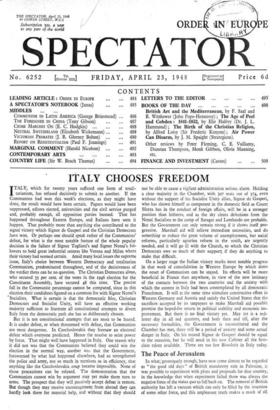ITALY CHOOSES FREEDOM
ITALY, which for twenty years suffered one form of totali- tarianism, has refused decisively to submit to another. If the Communists had won this week's elections, as they might have done, the result would have been certain. Papers would have been suppressed, editors ejected, universities and the civil service purged and, probably enough, all opposition parties banned. That has happened throughout Eastern Europe, and Italians have seen it happen. That probably more than anything else contributed to the signal victory which Signor de Gasperi and the Christian Democrats have won. Or perhaps one should speak rather of the Communists' defeat, for what is the most notable feature of the whole popular decision is the failure of Signor Togliatti's and Signor Nenni's fol- lowers to hold great industrial centres like Verona and Milan where their victory had seemed certain. Amid many local issues the supreme issue, Italy's choice between Western Democracy and totalitarian Communism, predominated throughout, and of the decisiveness of the verdict there can be no question. The Christian Democrats alone, who secured 35 per cent. of the votes in the 1946 election for the Constituent Assembly, have secured 48 this time. The precise fall in the Communist percentage cannot be computed, since in this election their candidates figured on a common list with Signor Nenni's Socialists. What is certain is that the democratic bloc, Christian Democrats and Socialist Unity, will have an effective working majority sufficient to frustrate all constitutional attempts to divert Italy from the democratic path she has so deliberately chosen.
But it is not constitutional attempts that are most to be feared. It is under defeat, or when threatened with defeat, that Communists are most dangerous. In Czechoslovakia they foresaw an electoral defeat which everyone predicted. Hence the resolve to seize power by force. That might well have happened in Italy. One reason why it did not was that the Communists believed they could win the election in the normal way, another was that the Government, forewarned by what had happened elsewhere, had so strengthened the police and army, not so much in numbers as in efficiency, that anything like the Czechoslovakia coup became impossible. None of those precautions can be relaxed. The demonstration that the Communists cannot win by argument may yet make them turn to arms. The prospect that they will passively accept defeat is remote. But though they may receive encouragement from abroad they can hardly look there for material help, and without. that they should not be able to cause a vigilant administration serious alarm. Holding a clear majority in the Chamber, with 307 seats out of 574, even without the support of his Socialist Unity allies, Signor de Gasperi, who has shown himself as competent in the domestic field as Count Sforza has in the conduct of foreign affairs, will be in a stronger position than hitherto, and as the sky clears defections from the Nenni Socialists to the camp of Saragat and Lombardo are probable. But the Government can only remain strong if it shows itself pro- gressive. Marshall aid will relieve immediate necessities, and do something to reduce the great volume of unemployment, but social reforms, particularly agrarian reform in the south, are urgently needed, and it will go ill with the Church, to which the Christian Democrats owe so much of their support; if they do anything to make that difficult.
On a larger stage the Italian victory marks most notable progress in that work of consolidation in Western Europe by which alone the onset of Communism can be stayed. Its effects will be more beneficial in France than anywhere, in view of the new intimacy of the contacts between the two countries and the anxiety with which the contest in Italy had been contemplated by all democratic Frenchmen. It will at the same time stimulate constructive effort in Western Germany and Austria and satisfy the United States that the sacrifices accepted by its taxpayers to make Marshall aid possible promise the hoped-for return in political stability and economic im- provement. But there is no final victory yet. May 1st is a red- letter day in all red quarters, and both then and till, after the necessary formalities, the Government is reconstituted and the Chamber has met, there will be a period of anxiety and some actual danger in Italy. On his record Signor de Gasperi should be equal to the occasion, but he will need in his new Cabinet all the first- class talent available. There are too few Bissolatis in Italy today.


































